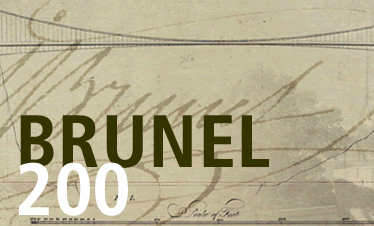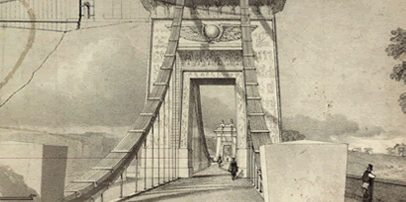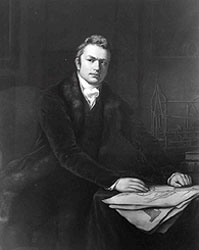


Portrait of Marc Brunel (ICE)






Isambard Kingdom Brunel was born in Portsea, Portsmouth on 9 April 1806. He was the only son of Marc and Sophia Brunel, and had two sisters: Sophia and Emma.
Marc Isambard Brunel (1769-1849) was a French royalist and naval officer who had fled France in 1793 during the Reign of Terror. He arrived in Britain in the spring of 1799, having spent some time employed as a civil engineer and architect in New York (he became a US citizen in 1796). Marc had invented a series of machines for making pulley blocks for ships, which could significantly increase the quality and rate of their production. The war between Britain and France was an ideal opportunity to exploit this process. Marc had a letter of introduction to the First Lord of the Admiralty from a mutual acquaintance and received permission to come to Britain to set up a block-making factory in Portsmouth docks to supply the Royal Navy. Among his other activities, Marc Brunel designed machines for making army boots, knitting stockings, sawing timber, and printing, two suspension bridges at Ile de Bourbon near Mauritius and a
floating landing stage at Liverpool. His greatest accomplishment and biggest project was the tunnel he constructed beneath the Thames between Rotherhithe and Wapping. He was knighted in 1841 for his contribution to British engineering having achieved little by way of financial success but having gained the respect of his peers.
On 1 November 1799, Marc married Sophia Kingdom (1775-1855), the daughter of a Plymouth naval contractor. They had met in Rouen at the home of Marc’s adopted family, the Carpentiers, and in 1793 they were engaged to be married. After Marc escaped to America, Sophia remained in France and when war with Britain broke out she was imprisoned as an enemy alien. She did not return home until 1795. Sophia endured a further three months in prison in 1821 when Marc Brunel’s business failed and he was imprisoned for debt: Sophia remained with him throughout his ordeal. Marc’s friends mounted a campaign to obtain a government grant of £5,000 to cover his debts and secure his release. The grant was partial compensation for the army-boots he had produced during the war but not been paid for. The Duke of Wellington intervened on his behalf after Marc threatened to emigrate to Russia and offer his services to Tsar Alexander unless the government paid him.
Soon after Isambard’s birth, the family left Portsmouth and moved to 10 Lindsey Row, Chelsea. As a boy, Marc Brunel had fallen out with his father, a prosperous farmer, because of his wish to become an engineer. Marc was pleased that his son Isambard showed an interest in engineering and taught him arithmetic, scale drawing and geometry at home. Despite the continuing financial struggle, Marc decided it was money well spent paying for his son’s education and sent him to a highly regarded pre-preparatory boarding school in Hove. While he was there, Brunel undertook a survey of the town and impressed his classmates when he predicted the partial collapse of a building being constructed opposite the school.
